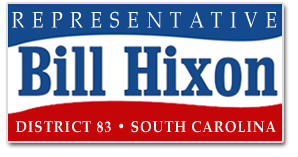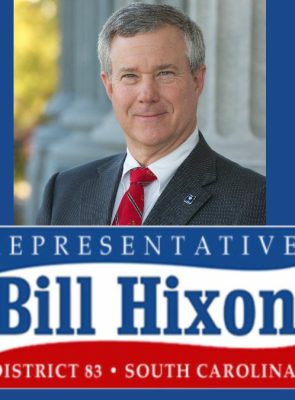If you would like to contribute, please mail a check to Hixon for House, P.O. Box 7927, North Augusta, SC 29861.
I hope that you find this update helpful and informative. If I can help you with an issue, please let me know. Thank you for reading and allowing me to serve you.
|
Legislative Update – June 11, 2015 |
The General Assembly sustained 19 of the 87 vetoes representing $75,000 in recurring dollars and $6.5 million non-recurring. Of the $6.5 million, $5 million was for the Water Quality line at DHEC, which the Senate sustained, but Senator Alexander noted a motion to reconsider it, so there is a possibility that they could revisit it in the future. As for now this is where we stand:
Appropriations Act:
- House sustained 16 of 83 vetoes (19%) and overrode 67 vetoes (87%)
- Senate received 67 vetoes; sustained 2 vetoes (3%) and overrode 65 veteos (97%)
- House and Senate sustained 18 of 83 vetoes (22%) and overrode 65 vetoes (78%)
Capital Reserve Fund:
- House sustained 0 of 3 vetoes (0%) and overrode 3 vetoes (100%)
- Senate received 3 vetoes, sustained 0 vetoes (0%) and overrode 3 vetoes (100%)
Supplemental:
- House sustained 1 of 1 veto (100%) and overrode 0 vetoes (0%)
- Senate received 0 vetoes
Click here to view the final budget summary for the fiscal year 2015-16
Frequently Asked Questions as to the Battle Flag
Here are some of the frequently asked questions that I have received with answers:
- What did the Battle Flag Bill do?: The Battle Flag bill lowered the single Confederate Battle Flag flying on the State House grounds and required that it be taken to the Confederate Relic Room (the state's military museum) for display. The bill also required the removal of the flag pole. The bill did not apply to any other flag on the State House grounds or anywhere else.
- What and where is the Confederate Relic Room?: The Relic Room is the State's Military Museum located next to the State Museum in Columbia. The Relic Room contains and displays several other authentic battle flags carried by South Carolina troops. To see it website, go here.
- Will the Battle Flag be Flown at the Relic Room?: The Relic Room's director stated that the Battle Flag will be displayed in an appropriate display of honor. The director, his staff, and the Relic Room Board have until January 1, 2016 to develop plans and a budget for the display of the Battle Flag. To learn more, go here.
- What Amendments were Offered in the Senate?: Amendments offered in the Senate included an amendment to fly the Battle Flag on Confederate Memorial Day only during daylight hours, this amendment failed 22-17. Also, an amendment to fly the first national flag of the Confederacy ("Stars and Bars") year round failed 34-6. Senator Tom Young voted for both amendments.
- What did the Attorney General Write about a Possible Referendum?: The Attorney General's office issued a letter on July 6th stating that any referendum–binding or non-binding–would be unconstitutional. To see the letter, go here.
- What Monuments are on the State House Grounds?: There are several monuments and markers on the State House grounds. None of these are impacted by the bill that applied only to the Battle Flag which flew on the flag pole on the north side of the State House. The State House grounds include monuments to President George Washington; Revolutionary War Generals; the Palmetto Regiment of the American Mexican War; Wade Hampton, III; Captain Swanson Lunsford; Women of the Confederacy; former U.S. Senators James F Byrnes, Strom Thurmond, Benjamin Tillman, and Dr. J. Marion Sims; South Carolina's law enforcement officers killed while on duty; South Carolina Veterans of the U.S. Armed Forces; Confederate Soldiers Monument; African-American History; and six bronze stars marking where Union cannon balls hit the State House in February 1865. To see an interactive map of the monuments and markers on the State House grounds, go here.
- Will Existing Monuments be Affected by the Flag Bill?: No, the Battle Flag legislation applied to the Battle Flag on the one pole on the State House Property. It does not extend beyond that. The Heritage Act requires a two-third vote of the General Assembly to remove, relocate, rename, disturb, or alter any monument in the State. Also, no street, bridge, structure, park, preserve, reserve, or other public are of the State or any of its political subdivisions dedicated in memory of or named for any historic figure or historic event may be renamed or rededicated without a two-thirds vote of the General Assembly. I do not support modifying any existing monuments, street names, or park names.
- When did the Battle Flag go up on State House property?: The Confederate Soldier's Monument to South Carolina's soldiers who died in the Civil War was erected in May 1879. In 1962, the General Assembly voted to fly the Confederate Naval Jack–similar to the Battle Flag flying in front of the State House– from the State House dome. In 2000, the General Assembly voted to take the Confederate Naval Jack off the dome and to place the Battle Flag behind the Soldier's Monument. The Battle Flag few near the Soldiers Monument for the last 15 years.
- Can I fly the Battle Flag on my Property?: Some constituents have asked whether the bill will prohibit their right to fly the Battle Flag on their property. It does not. The bill only applies to the one flag on the State House grounds. The bill has no impact on any other flag in any other place.
- Does the General Assembly's Flag Bill apply to Cemeteries?: No, the General Assembly's Battle Flag Bill passed only lowered one flag on State House grounds. The bill has no impact on any other flag in any other place. This means the Genera Assembly's action does not prohibit the flying of Confederate flags in cemeteries around the state.
- What is your Position as to the Monuments?: I do not support modifying any existing monuments, street names, or park names.
Domestic Violence Reform Act
The General Assembly approved the comprehensive Domestic Violence Reform Act (S.3) which includes recommendations of special committees appointed in both the House of Representatives and Senate to focus on the issue. The legislation revises criminal penalties for domestic violence so that they emphasize not only the number of previous incidents but also better address the severity of violence as well as take into account whether certain aggravation circumstances are involved. Under the revisions, enhanced criminal penalties apply if certain egregious elements are present in an incident, such as strangulation, abuse committed in the presence of children, abuse of pregnant women, and violence that is used to prevent someone from summoning emergency assistance or reporting a crime. Penalties are increased for Domestic Violence of a High and Aggravated Nature and all three degrees of Domestic Violence so that these crimes carry higher possible maximum terms of imprisonment. The legislation establishes firearms restrictions in conjunction with domestic violence offenses that include an automatic lifetime prohibition on possessing firearms and ammunition for those convicted of the felony Domestic Violence of a High and Aggravated Nature, an automatic ten year ban for those convicted of the felony First Degree Domestic Violence and provisions that allow a ban of up to three years in convictions for the misdemeanor domestic violence offenses. The legislation's bond reform measures include a requirement that, whenever someone is charged with a domestic violence violation, the bond hearing may not proceed without the person's criminal record and incident report or the presence of the arresting officer. The legislation includes provisions that allow victims of domestic violence, sex crimes and certain other offenses to obtain a permanent restraining order against an offender which a judge puts in place for life so that the order would not need to be periodically revisited and extended. A new statewide multidisciplinary Domestic Violence Advisory Committee is established and charged with decreasing the incidences of domestic violence in SC by undertaking public education efforts, studying domestic violence in the state, assessing the effectiveness of state laws and programs to combat the problem, and advising on policy and practice changes, including the issuance of an annual report. The legislation also requires the subject of domestic violence to be incorporated into the instruction that public school students receive in comprehensive health education in grades six through eight.
Human Trafficking
The General Assembly approved legislation to enhance South Carolina's ability to combat human trafficking. Legislation S.196 includes human trafficking offenses within the jurisdiction of the state grand jury and establishes new requirements for posting National Human Trafficking Resource Center Hotline information that apply to a list of establishments such as adult businesses, massage parlors, hospital emergency rooms, agricultural labor contractors, hotels, motels, airports, train stations, bus stations, rest areas, and truck stops. Lawmakers also adopted the Uniform Law Commission recommendations, S.183, for enhancing the prosecution of human traffickers, punishing businesses that aid human trafficking operations, and improving protection and restitution for victims.
Body-Worn Cameras
Lawmakers approved provisions S.47 for equipping law enforcement with body-worn cameras that make audio and video recordings. The legislation requires state and local law enforcement agencies to implement the use of body-worn cameras according to guidelines established by the Law Enforcement Training Council that addresses such issues as which law enforcement officers must wear cameras, when they must be worn and activated, how recordings should be retained and released, and how consent should be obtained from victims and witnesses for recording their interviews. A Body-Worn Cameras Fund is established within the Department of Public Safety to assist agencies with implementation by addressing costs associated with such matters as the initial purchase of cameras, equipment maintenance and replacement, and data storage for recordings.
Uniform Deployed Parents Custody and Visitation Act
The "Uniform Deployed Parents Custody and Visitation Act", H.3156, was approved to establish protocols to address issues of custodial responsibility that arise when a parent in the uniformed Armed Services is deployed, including provisions for temporary child custody orders and agreements that are put in place during the time of deployment.
As always, thank you for the privilege of serving you in Columbia. If I can ever be of assistance to you, or if you have ideas on issues you want me to share with the rest of the General Assembly, please do not hesitate to contact me.



